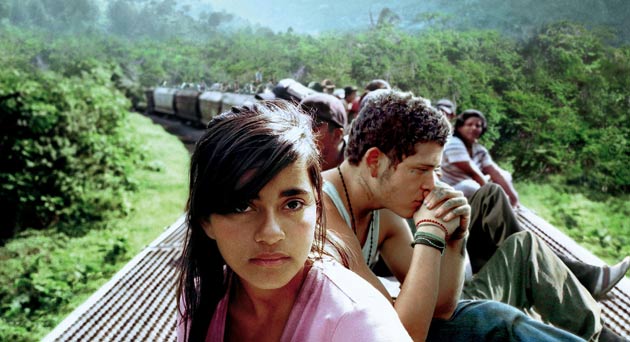Sin Nombre (15)
There's a worrying assumption to this tale of youngsters trying to escape the poverty of Central America for the riches of the US

I haven't looked closely at the poster for Mexican-set drama Sin Nombre, but if it doesn't somewhere feature the blurb, "Tough .... Brutal .... Uncompromising", then the next round of quesadillas is on me. Young American director Cary Fukunaga is the type who likes getting his hands dirty. His main theme is the perils facing Central Americans as they try to reach the US border on the roof of a freight train: Sin Nombre was shot on just such a train, and Fukunaga researched by taking the perilous journey himself.
All that is one part of Sin Nombre. The other is a crime story about the Mara Salvatrucha, a Central American gang that has adopted hip-hop dress and codes – right down to calling each other "homey" or "homito". One young marero or gangbanger, Casper (Edgar Flores), falls foul of his crew in Chiapas, and hops the train north. We know Casper is not nearly such a hard nut as his cohorts: where gang leader Li'l Mago (Tenoch Huerta Mejía) has a face so heavily embellished with Gothic lettering and devil horns that you can barely see the flesh, Casper's facial tattoo is a single teardrop, making him look at once a tragic hero, a marked man, and a redeemable sweetie pie.
Meanwhile, teenage Sayra (Paulina Gaitan) is from Honduras, her father accompanying her on the ride north. There are two stories here, and two films. Sayra's tale alone would have made Sin Nombre one of those worthy and heartful dramas of Latin American deprivation that US independent cinema produces occasionally: eg. Maria Full of Grace. But that might also have given Fukunaga something to concentrate on. As it is, the mix of stories makes Sin Nombre neither one thing nor the other.
We seem to be in for a classic road movie – or rail movie – but there's finally little travelling done, given the brief running time. By the time Casper and Sayra have abandoned the train and reached the border, where final perils await, you don't quite feel you've taken the journey you signed up for. I'm not asking for the Sin Nombre theme ride: I just wished that Fukunaga had taken the time to more fully evoke the discomfort, the grief, even the boredom of the journey. Compare Michael Winterbottom's In This World, where you really feel the rigours of the road from Peshawar to Kilburn.
The gang-thriller strand relies on too many cheap shots. Li'l Mago warns a cowering prisoner that he'll soon be feeding him to the dogs. Cut to a bucketful of guts: so that wasn't just a juicy metaphor. We also see this terrifying thug cradling his baby in a yellow romper suit, looking like a satanic version of the Eighties Athena "New Man" poster. It's too obviously loaded an image, instantly pressing the button that makes you tremble for another wasted life ahead: Fukunaga, who never shows much evidence of a sense of humour, doesn't really seem to enjoy the grisly absurdity of the image.
Overall, the film comes across as a routine Latino damaged-youth drama, drawing on the well of City of God and Amores Perros, but without the stylistic gusto. Sin Nombre is solid and watchable, well acted and executed with real nerve, but ultimately earnest and pedestrian, lacking the narrative invention and documentary intensity that might have made it exceptional. While its dialogue is entirely in Spanish (the film is executive produced by those two cheerful promoters of young Mexican cinema, Gael Garcia Bernal and Diego Luna), Sin Nombre is an American-Mexican production, developed through the Sundance Institute. This doesn't necessarily mean that it has the ideological heart of a US film. But it does worry me that Sin Nombre suggests that everywhere south of Tijuana is an inferno of violence and treachery where innocent children are fated to grow up corrupted if they don't get shot or eaten first, while the US offers a glimmer of redemptive hope. Mind you, what we see of North America at the end of the film is a vista of freeways and Wal-Marts: you might prefer to take your chances with the devil dogs of Chiapas.
Subscribe to Independent Premium to bookmark this article
Want to bookmark your favourite articles and stories to read or reference later? Start your Independent Premium subscription today.

Join our commenting forum
Join thought-provoking conversations, follow other Independent readers and see their replies